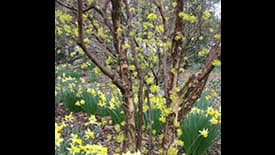College of Liberal Arts & Sciences

University to host screening of documentary ‘Creative Abundance’
“Creative Abundance” is a documentary that examines services in place for individuals with developmental disabilities, usually in the form of vocational and rehabilitative workshops that often are sheltered from the public eye and from community interaction.
UNC Charlotte will host a free screening of the film at 2 p.m., Tuesday, April 12, in the Cone University Center, McKnight Hall.

Religious studies chair earns award for innovative teaching
For innovative teaching methods that extend well beyond a traditional classroom setting, Joanne Maguire Robinson, chair of the Religious Studies Department, has received the 2016 American Academy of Religion Excellence in Teaching Award.
Since joining the UNC Charlotte faculty in 1996, Robinson has focused on how students engage with the classroom environment. She sees the job of a teacher as creating an environment that helps students leave as more informed, more reflective and more capable and resourceful thinkers.

Colloquium to explore ‘Death, Dying and Beyond’
The one-day colloquium “Death, Dying and Beyond: Understanding Ourselves at the End” will be held from 8:30 a.m. to 4:45 p.m., Friday, April 22, at UNC Charlotte Center City.

‘Feminist Wire’ founder, editors to discuss Internet activism
Tamura Lomax, Darnell Moore and Heather Talley will participate in the discussion “The Feminist Wire — It’s Not Slacktivism: Innovating Intersectional Feminist Activism in the Age of #BlackLivesMatter” at 7 p.m., Tuesday, March 29, in the Cone University Center, McKnight Hall.

Schneider among UNC BOG Teaching Excellence Award recipients
Stanley Schneider from the Department of Biological Sciences in the College of Liberal Arts & Sciences is one of the recipients of the 2016 UNC Board of Governors Awards for Excellence in Teaching.
This annual honor recognizes one professor at each of North Carolina’s public institutions. The 17 recipients were nominated by individual campus committees and selected by the Board of Governors’ Committee on Personnel and Tenure. Each award winner will receive a commemorative bronze medallion and a $12,500 cash prize.

Learn how to plant a tree
Jeff Gillman, director of the UNC Charlotte Botanical Gardens, will teach a course on proper tree planting from 10 a.m. to noon, Tuesday, March 22, at the McMillan Greenhouse.
According to Gillman, trees can spend a hundred years or more growing in the spot where planted, so it is important to give them a strong foundation.

Film festival offers rich tapestry of international movies
Explore and experience the rich world of contemporary film through selections from Brazil, Chile, China, Ecuador, El Salvador, France, Germany, Iran, Italy, Japan, Mauritania, Mexico, Nicaragua, Russia, South Korea, Spain and Uruguay during UNC Charlotte’s annual International Film Festival.

‘Nexos’ to examine Latino vote and the 2016 presidential election
David Leal, professor of government at the University of Texas at Austin, and Federico Rios, program director of Elementary School Services at Communities in Schools of Charlotte Mecklenburg, will lead a public conversation about Latino votes in the presidential campaigns on Thursday, March 31.
“Nexos: The 2016 Presidential Election and the Latino/a Vote” will be held at UNC Charlotte Center City; doors open at 5 p.m., and the program will begin at 5:30 p.m. with a reception at 6:30 p.m.

University to host National Council for Black Studies 40th conference
The UNC Charlotte Africana Studies Department will host the 40th annual conference of the National Council for Black Studies (NCBS) from Thursday, March 17, through Saturday, March 19, at the Omni Hotel. The 2016 theme is “Forty Years of Black Studies in the Local, National and Global Spaces: Past Accomplishments and New Directions.”

Visiting Brazilian scholars researching amphibian genetics, poisons
Two researchers from Brazil are working with Daniel Janies, the Carol Grotnes Belk Distinguished Professor of Bioinformatics and Genomics, to better understand the genes that allow amphibians to generate and resist the poisons they use for defense.